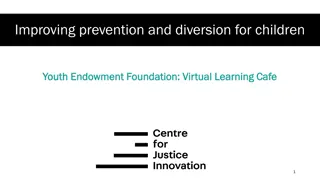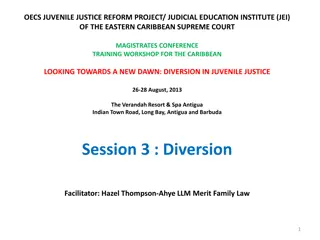
Mental Health Support Services in Chatham-Kent Area
Providing mental health diversion programs and support services in Chatham-Kent through partnerships with justice and social service systems. Services include court support, release from custody support, and referrals for individuals with mental health needs involved in the criminal justice system.
Download Presentation

Please find below an Image/Link to download the presentation.
The content on the website is provided AS IS for your information and personal use only. It may not be sold, licensed, or shared on other websites without obtaining consent from the author. If you encounter any issues during the download, it is possible that the publisher has removed the file from their server.
You are allowed to download the files provided on this website for personal or commercial use, subject to the condition that they are used lawfully. All files are the property of their respective owners.
The content on the website is provided AS IS for your information and personal use only. It may not be sold, licensed, or shared on other websites without obtaining consent from the author.
E N D
Presentation Transcript
Mental Health Diversion Canadian Mental Health Association Lambton Kent Branch
Mental and Justice Program Goals To serve as access and coordination points for the social service and criminal justice systems To help prevent/reduce the involvement of persons with mental health in the criminal justice system.
Court Support Services Court support worker will provide support to individuals involved in the court system experiencing mental health symptoms Can assist with Mental Health Diversion if person meets criteria (provided in later slides) provide support and information for family members and/or significant others Linkage to community supports Consultation to individuals, police, legal personnel Assistance with Form 2 applications
Release from Custody Services Release from Custody worker provides short term (3 months), intensive case management services to individuals with a diagnosed MMI or SMI who are being released from custody facilitates a stable transition back to the community Linkages to longer term case management services, rehabilitative programs/medical treatment Consultation with individuals, police, legal personnel Provides a central point of contact for individuals to access/be referred to mental health services and other required supports; coordinates a continuum of services based on client choice and need
Referrals can be made by: Other CMHA workers or programs The consumer The consumer s family or peers Lawyers Correctional Facilities Ontario Works/ODSP Probation/Parole Police Services Other social service agencies
Mental Health Diversion Program Criteria Be 16 years of age or over Is a resident of the Chatham Kent area or moving back to an address in this area Has been charged with an eligible criminal offence under the criminal code of Canada Class 3 offences are never eligible for mental health diversion
Process Court support worker refers to mobile PAN for pre- assessment and then appointment with psychiatrist booked Risk assessment and recommendations provided to crown Court worker creates diversion plan to present to Crown Diversion plans last approximately 1 year
Possible Outcomes Stay of proceedings Peace bond Withdrawal of charges
Case Study Diversion #1 21 year old male Diagnosis: schizophrenia Charges: assault Currently in progress
Case Study Continued Diversion #2 54 year old female Bipolar Charges: theft under $5000; possession of stolen property under $5000; flight from a police officer Successfully completed
Measure of Success Clients spend less time in custody Reduced numbers of mentally ill incarcerated Increase awareness, knowledge and skills in community, courts, institutions and correctional services to recognize and support the client To reduce numbers of mentally ill in contact with hospitals, police, and courts Reduced rate of recidivism






















